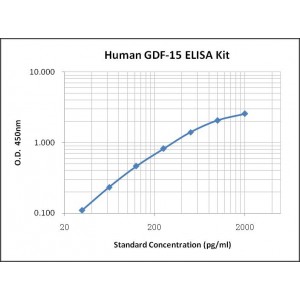More info
|
Assay Range |
31.2-2,000 pg/mL |
|
Sensitivity |
10.0 pg/mL |
|
Specificity |
No cross-reaction with other related substances detected |
|
Size |
96T |
|
Storage |
Store at 2 - 8ºC. Keep reconstituted standard and detection Ab at -20 ºC |
|
Assay Principle |
Sandwich ELISA |
|
Sample Volume |
100 µL final volume, dilution factor varies on samples |
|
Detection Method |
Chromogenic |
Kit Components
1. Recombinant Human GDF-15 standard: 2 vials
2. One 96-well plate coated with Human GDF-15 Ab
3. Sample diluent buffer: 12 mL - 1
4. Detection antibody: 130 µL, dilution 1:100
5. Streptavidin-HRP: 130 µL, dilution 1:100
6. Antibody diluent buffer: 12 mL x1
7. Streptavidin-HRP diluent buffer: 12 mL x1
8. TMB developing agent: 10 mL x1
9. Stop solution: 10 mL x1
10. Washing solution (20x): 25 mL x1
Background
Growth Differentiation Factor-15 (GDF-15), also known as macrophage inhibitory cytokine-1 (MIC-1), placental transforming growth factor-β, prostate-derived factor, and placental bone morphogenetic protein, is a member of the transforming growth factor beta (TGF-β) superfamily. GDF-15 is synthesized as a 40 kDa inactive precursor protein which is then generated as a disulfide-linked 28 kDa active homodimer by proteolytic cleavage. In humans, GDF-15 is primarily expressed in the placenta, with low levels in the kidney, pancreas, and prostate. Its expression can be rapidly induced by cytokines such as interleukin-1 and TGF-β. GDF-15 plays an important role in tumorigenesis and metastasis. It is reported that in many types of cancers, such as colorectal, breast, and prostate, the expression of GDF-15 is dramatically increased. Furthermore, GDF-15 is strongly induced by the tumor suppressor gene p53 and other anti-tumorigenic agents, such as the non-steroidal anti-inflammatory drugs and peroxisome proliferators activated receptor γ, suggesting that GDF-15 may be a downstream target of those signaling pathways that regulate cell cycle arrest and apoptosis. GDF-15 has also shown its cardioprotective functions. In mouse models, induction of GDF-15 protects the heart from ischemia/reperfusion injury and its overexpression attenuates ventricular dilation and heart failure. GDF-15 might exert its cardioprotective effects through activation of the PI3K-Akt signaling pathway and the Smad protein. In addition, significant induction of GDF-15 has been observed in individuals with iron deficiency, indicating that GDF-15 may play a role in iron homeostasis.
PRODUCT CITATION:
- Changes in body mass, appetite-related hormones, and appetite sensation inwomen during 4 days of hypobaric hypoxic exposure equivalent to 3,500-maltitude
Hannes Gatterer et al.
J Appl Physiol 134: 133–141, 2023.


